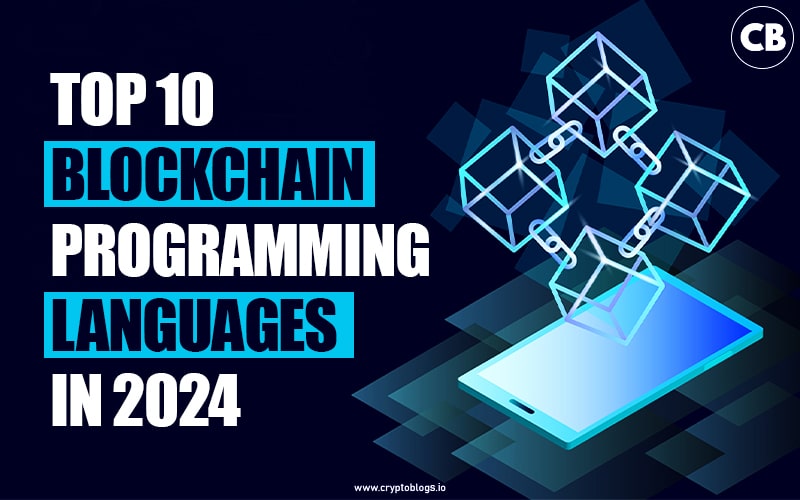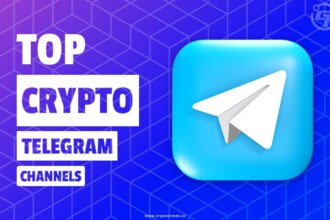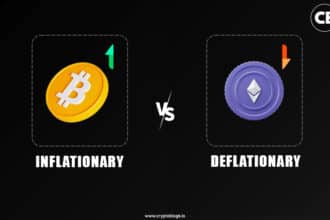In the ever-evolving area of blockchain development, proficiency in blockchain programming languages is non-negotiable. This introduction serves as your gateway to the world of blockchain programming, offering insights into the languages shaping the future of decentralized applications. Embark on this journey with us as we unravel the intricacies of blockchain programming languages and their transformative potential
The blockchain industry has reached a peak point where numerous blockchain-based applications are dominating the finance sector and gaining worldwide attention. This growth has raised curiosity among the developers who have started thinking about launching their own blockchain applications. The blockchain landscape also has a slightly different approach to developing applications, and sometimes, it requires specialized knowledge.
The development of a blockchain application differs from traditional software development as it must be for developers to understand the tools and technology used in cryptography and core blockchain functionality. To get started in blockchain, It is necessary to first catch up with programming languages that are used in the development of smart contracts and other blockchain applications.
In this article, we have discussed on the best blockchain programming languages that are used to develop smart contracts and blockchain applications.
Also Read: Everything about Blockchain Development: Perks & Possibilities
Solidity
Solidity is the most popular blockchain programming language, explicitly used to develop smart contracts on Ethereum and other EVM-compatible blockchains. It is an object-oriented language that shares similarities with C and C++ programming. This includes syntax, variables, functions, classes, logical operators, and several other concepts. The core functionality of Solidity is to build business logic and automate transactions while bridging Smart Contracts to the Ethereum Virtual Machine (EVM).
Solidity is easy to learn and understand with ample experience in initial-level programming languages like C. However, implementing logic and mathematical operations requires in-depth knowledge and understanding.
Difficulty Level: 4/5
Rust
Rust is a recent popular programming language that focuses on memory management and thread safety while improving overall performance. Popular high-throughput blockchains, including Solana, PolkaDot, and Parity, use Rust to enable high speed and achieving performance efficiency. Rust provides memory safety without garbage collection, which helps in avoiding memory leaks or buffers.
Although Rust is hard to learn compared to other blockchain programming languages, it offers robust efficiency and reliability for blockchain projects. Rust can also be integrated with different programming languages, where it can function seamlessly.
Difficulty Level: 5/5
Javascript
Javascript is one of the most popular programming languages among developers, and it offers several libraries and frameworks. Javascript has also become a blockchain programming language that is used to create smart contracts and build a new blockchain from scratch.
While languages like Solidity and Rust make it complicated for developers, the implementation of Javascript opens a wide door for them without needing to learn all those explicit programming languages to get started with blockchain development. Javascript libraries like web3.js and ethers.js are currently used in most blockchain programming.
A variety of frameworks and exciting resources make it easy to get along in blockchain development using Javascript. Javascript can also be used with Solidity to design and deploy smart contracts on Ethereum.
Difficulty Level: 3/5
Python
Python is also an object-oriented programming language like Solidity, used in a variety of domains such as software development, data science, machine learning (ML), and others. It is by far the easiest programming language one can learn and understand. Python’s comprehensive features and libraries make it an ideal programming language for coding smart contracts and other blockchain elements like consensus or block production.
The syntax simplicity, readability, and extensive implementation of Python enable to achieve high performance and greater efficiency in blockchain development. Libraries like hashlib, binascii, and ECDSA provide essential functionalities in shaping novel blockchain architectures.
Difficulty Level: 2/5
Go Lang
Go Lang or Go is another programming language that is easy for beginners to learn and understand. Google has developed it, which shares similarities with Python. The concurrency in Go enables the simultaneous handling of multiple transactions, which is crucial for blockchain scalability. Go is also a compiled language; hence, it makes executions faster and is ideal for blockchain programming.
One of the most popular blockchain applications built using Go Lang is Cosmos-SDK. This blockchain development kit enables a variety of blockchain networks to be built without requiring minimal coding. Another popular blockchain infrastructure, Hyperledger Fabric, also uses Go Lang to write smart contracts.
Difficulty Level: 2/5
Move
Move is a recently released blockchain programming language that was explicitly designed for Facebook’s Diem project. Due to regulatory hurdles, Facebook had to shut down the project, but Move lived as an open-source programming language that Aptos and Sui now utilize. Both these blockchain projects were developed by former Facebook employees who built the Move programming language. Move’s architecture is based on Rust programming language.
As a statically typed programming language, Move allows developers to avoid common programming errors and vulnerabilities. These novel functionalities put Move among the leading smart contract and blockchain programming languages.
Difficulty Level: 4.5/5
Vyper
Vyper is an alternate smart contract programming language for Ethereum. It was developed and released by Vitalik Buterin in 2017. While using Solidity in smart contracts often leads to unseen vulnerabilities, Vyper eliminates complex syntax and simplifies the developing experience while aiming to avoid vulnerable code.
Vyper has logical similarity with Solidity and syntactic similarity with Python, making it an ideal choice for building smart contracts for Ethereum developers. Vyper does not have some of the Solidity features, such as overflow, infinite loops, modifiers, etc.
Difficulty Level: 4/5
Java
Java is another popular programming language that is widely used in blockchain project development. It is a developer-friendly and platform-independent language that makes it easier for developers to launch blockchain-based applications. Java supports heavy application programming interfaces (APIs) and object-oriented programming features, which makes it more adaptable.
The multithreading feature of Java allows one to run more than one thread at a time, leading to flexibility and efficiency. It is used to frame several leading blockchain networks from scratch, like Ethereum, IOTA, NEO, etc.
Difficulty Level: 4/5
PHP
PHP is used in a variety of software development and applications. This OG programming language could also be leveraged to develop blockchain applications with its platform-independent architecture like Java. Used mainly for mobile application development, PHP has several libraries to create blockchain applications.
Difficulty Level: 3.5/5
C++
C and C++ are both some of the oldest programming languages that are still functional and used in blockchain projects like Bitcoin, Ripple, and Litecoin. The object-oriented functionality of C++ makes it easy to create blockchain modules for molding data and securing it with a cryptographic chain. It is easy to use and implement compared to all other object-oriented programming languages.
Difficulty Level: 3/5
Conclusion
The blockchain industry is becoming more prominent day by day, and thousands of developers are pivoting to smart contracts and blockchain development. With the help of these blockchain programming languages, we can develop limitless applications on top of blockchain and even create novel solutions using the core value of blockchain technology. This space has enabled developers with an ultimate advantage to create their own apps and get paid for them without relying on full-time jobs. There are numerous resources and tools available on the internet to get started with blockchain development.
Also Read: Blockchain Development: 5 Essential Steps To Launch New Blockchain
FAQs
How To Choose the Best Blockchain Programming Language
Out of all the listed above, choosing an ideal blockchain programming language would depend on the usability and type of blockchain project. If a blockchain project needs to be developed from scratch, then it requires Java, C & C++, Python, etc., but for smart contract development, it would require Solidity, Vyper, or Javascript. Some blockchain projects even combine multiple programming languages to develop a perfect application.
Which programming language is used for blockchain development?
Blockchain development could be done with different languages such as Javascript, Solidity, Python, C++, etc.; it depends on the functionality of the project.
Which programming languages are used in Ethereum smart contract?
Ethereum smart contracts are mostly designed using Solidity. Additionally, it can be developed using Javascript, Vyper, and Python.
What programming languages are required to become a blockchain developer?
One should be aware of primary programming languages like C, C++, Python, and Java in order to become a blockchain developer.







